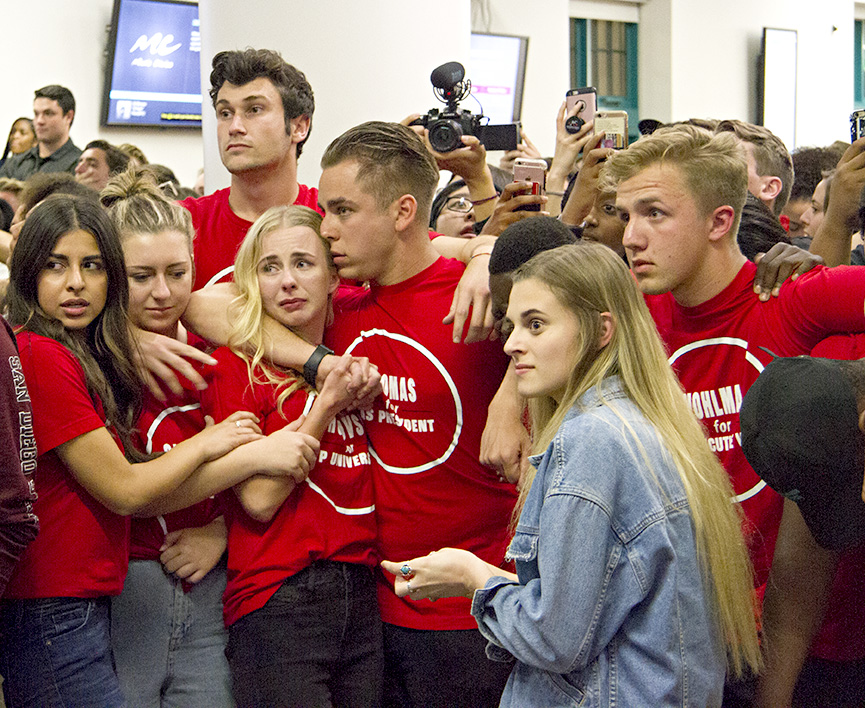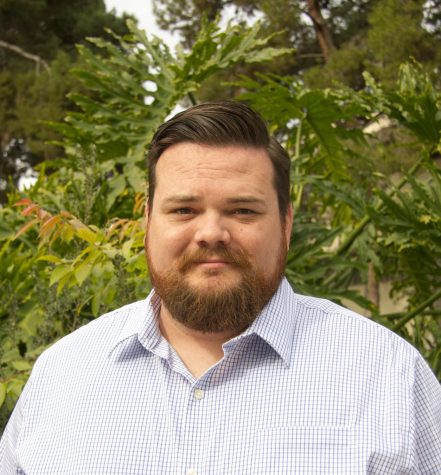This year’s 2018 Associated Students elections began with three out the five executive positions candidates running unopposed.
Less than a week before the election, two write-in candidates joined the race for president, while the positions of executive vice president and vice president of financial affairs remained unopposed.
“That’s scary that we don’t have enough students wanting to fill the positions that determine the future of the school,” liberal studies senior Kayla Knecht said. “More people used to be involved in the elections, but there hasn’t been very much information this year in particular that is encouraging students to be involved.”
Some students said that A.S. could have done more to encourage student’s participation in this year’s election. Some also felt that the candidate’s campaigns focus too much on the faces of the candidates, rather than the candidate’s plans of action or positions they are running for.
“I don’t even know if we can really trust the people (who are running),” biology sophomore Megan Sterling said. “No one knows what they’re actually voting for, they just know who they’re voting for. It’s more of a popularity vote.”
Students were able to access candidates’ profiles on the Daily Aztec website, which included information about why the candidate is running, their qualifications and their plans of action if elected. The candidates’ statements are also posted on the Associated Students elections website.
Chris Thomas was originally the only candidate running for A.S. president. In his campaign statement, he said his plan is to continually improve academics, address concerns, and encourage involvement of students on campus.
“While I am the only one on the ballot, there are still two write-in candidates that deserve the acknowledgement for running for Associated Students president,” Thomas said before the election results were announced on March 22. “For me, being the only one on the ballot doesn’t mean I can just sit down comfortably and relax. I have to fight for my entire family to win and also prove to myself that people actually know who I am so they can hold me accountable if I win this election.”
Civil engineering sophomore Adrian Maya said he feels it’s unfair to have unopposed candidates for three positions.
“I’d like to see more diversity that gives students a chance to see the different types of change we can have with new people,” Maya said.
Bill James is a mathematics junior who has voted in the last two A.S. elections along with this year’s.
“I voted for the candidates who were running unopposed because they seem very qualified for the positions they were running for,” James said. “Although the past few years may have been more competitive, it doesn’t make the standard for the positions any lower.”
James felt that even though the candidates were running unopposed, they had enough experience to properly fill the positions they were running for and their plans of action were going to benefit the future of San Diego State University.
Professor Hongmei Shen, SDSU’s public relations director, said lack of student participation in elections is a problem.
“If students are actively participating in the student government then we want them to be aware of issues and decisions being made,” Shen said. “If there are barriers to students participating in the elections then Associated Students need to work more to find out what those barriers could be and come up with solutions to solve them.”
Civil engineering junior Terrance Hutchison said he thinks the two write-in candidates, Alexander Pearson and Megan Mueller — both of whom ultimately received less than 200 votes each — didn’t stand a chance against the candidate whose name was actually on the ballot.
“I think people will still automatically check the box for the running candidate, rather than taking the time to fill in a name they probably don’t know much about either,” Terrance Hutchison, a civil engineering junior said.
The election results were announced on Thursday, March 22, at 8 p.m. in the Lee and Frank Goldberg Courtyard on the second floor of the Conrad Prebys Aztec Student Union. Chris Thomas was elected president with 93.2 percent of the vote. The candidates for executive vice president and vice president of financial affairs, without opposition even from write-in candidates, received 100 percent of the vote.










